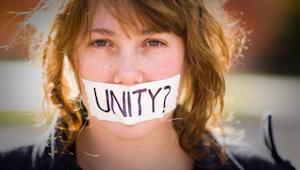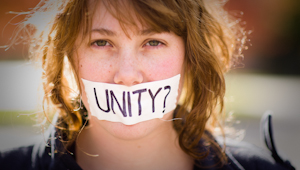They'll Know We Are Christians

 Too often, communities of color find it difficult to differentiate between white Christians and white non-Christians when it comes to issues of racial justice. In his co-authored book More Than Equals, Spencer Perkins observes that:
Too often, communities of color find it difficult to differentiate between white Christians and white non-Christians when it comes to issues of racial justice. In his co-authored book More Than Equals, Spencer Perkins observes that:
“White Christians’ decisions to choose the comfort of their own race over the Christian ideals of brotherhood and oneness that our gospel so boldly preaches have undoubtedly weakened their witness to the African-American community.”
His convicting statement reflects the reality that, in moments of racialized debate on campus, students of color feel they cannot count on their white Christian sisters and brother to have their back.
My own alma mater went through numerous racial scandals during my tenure there (the hanging of a black doll by a noose, blackface Halloween consumes, ignorant op-ed articles). Too often, the Christian fellowships’ response to those hurt by such events was either muted, late, or nonexistent, leaving the marginalized to wonder if our sermons about unity and diversity were just for show. True, some students took a stand, but they acted (and were perceived) as individuals, rather than as representatives of Christ and his Church. As a body of believers, we distanced ourselves from controversy, and we failed to manifest Christ’s love in solidarity. At our worst, we added to the voices second-guessing the cries of racism.
Yet we know from scripture that we are to “learn to do good; seek justice, correct oppression,” and “to loose the chains of injustice and untie the cords of the yoke” (Isaiah 1:17, 58:6). If we are to be a body of Christ, we have to understand that the reconciliation for which our souls long cannot come without the justice that our racial brokenness requires.
After all, isn’t that the miracle of Christ? That “we have now been justified by his blood” (Romans 5:9), as a gift from God “who reconciled us to himself through Christ and gave us the ministry of reconciliation” (2 Corinthians 5:18). In his death on the cross, Jesus accomplished both perfect reconciliation and perfect justice, both of which are necessary for the redemption of a broken world.
So too must we achieve reconciliation through acknowledging racial injustice, followed by action against it. This means going beyond proclamations of unity and community, and gaining a willingness to bear with each other’s burdens.
White students can start by educating themselves about the issues important to our sisters and brothers of color. Listen. Don’t argue, don’t try to refute. Begin to un-train the years of learned biases. Become a place of sanctuary, where students of color can be confident that their voices will be heard. Become a fellowship where they will no longer have to explain themselves, and their concerns will not be dismissed. White students will need to set aside their fears of being chastised, and approach racial discussion with hope and humility.
At the same time, I beg students of color to reward this courage with patience and holy love. Believe that, on the whole, white folk are genuine in our desire to reach out. But equal is our dearth of understanding about how to accomplish it and our fear of being rejected despite our efforts. Be brave, be gracious, be patient, be forgiving. Be merciful, in the truest sense of it. We are dependent on your faithfulness with us. There are those who are understandably tired of trying to reconcile, weary of the ignorance and the insults, but as Christians we have an added responsibility to bear with one another with grace and love.
What made the difference for my own racial education was hearing the personal stories from students of color at an InterVarsity women’s retreat. I heard how racism was alive on our campus, and that it personally affected the people around me, every day. They told me that they didn’t want me to be colorblind, but rather to celebrate how we were “fearfully and wonderfully made” (Psalm 139:14). I am so grateful to these women (and those that followed) that had the patience and strength to help educate me, despite my having never taken the time to educate myself. They showed me the love of Christ, even when it was not being shown to them on campus.
Once we have committed to educating ourselves and bearing with each other, we become active allies on campus. We are the first to speak up against injustice and ignorance. We initiate partnerships, and support the efforts of diversity initiatives on campus. We show up, we participate, and we make our voices heard.
And then we will be different. Then we will bear witness to the power of Christ for justice and reconciliation on today’s campus and in today’s world.
In his book Kingdom Come, Allen Wakabayashi asserts, “the world needs to see that our faith really does make a difference for life, especially as we deal with some of the most vexing social struggles, like race, gender, and class suppression.”
As we go through our daily lives, are we living the witness of Christ when it comes to racial justice and reconciliation?
Do we bear the same fruit as the rest of campus or are we different?
Do they know we are Christians?
Katelin Hansen (@strngefruit) is an alumna of the University of Richmond InterVarsity undergraduate and Umoja chapters, and is currently a member of InterVarsity’s Emerging Scholars Network at The Ohio State University. Katelin is the editor of By Their Strange Fruit (BTSF), an online forum to facilitate racial justice and reconciliation from a Christ-minded perspective, increasing the visibility of healthy and holy racial discussion.



